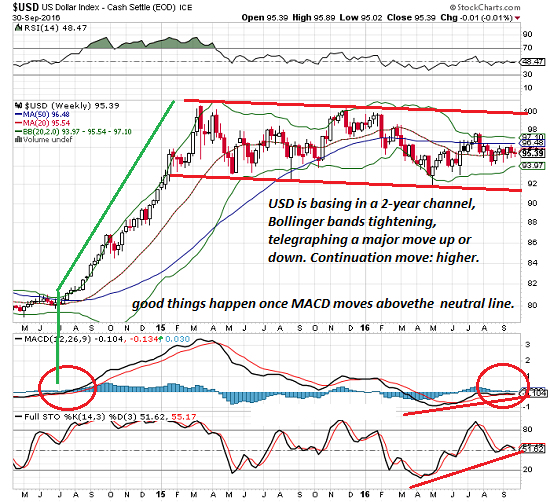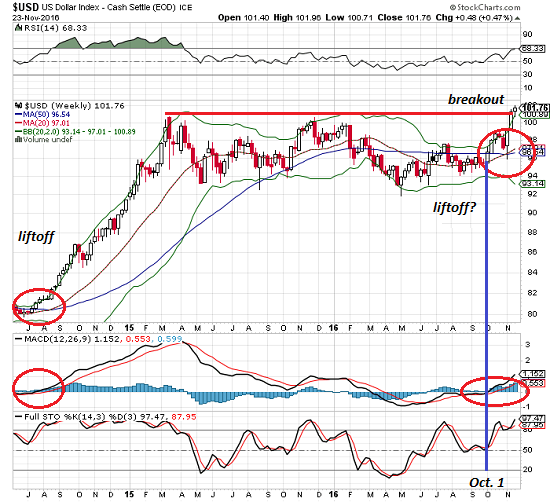So where will mobile capital flow in an environment of rising socio-political risk, a multi-year USD uptrend and a dearth of safe, liquid markets?
And here's the current weekly chart of the USD:
Note the apparent breakout above 100 and the constructive similarities to the 2014 breakout that was followed by a 20% increase in the purchasing power of the USD relative to other currencies.
This begs the question: could the US dollar be starting another extended leg higher that would eventually take it to 120, a 20% gain from its current level?
This raises a further question--why shouldn't the USD rise another 20%?Longtime readers are all too familiar with my many essays on the US dollar over the past four years, and so they shouldn't be surprised that the USD is moving higher.
While I have great respect for the analytic skills of the many dollar bears who have expected the USD to decline or collapse, we all have to respect the market's movement. In the case of currencies (which trade in the trillions of dollars daily), it's difficult to make a persuasive case that currency trends are driven by central bank interventions.
Policies such as interest rates and bond-buying, yes--intervention, not likely. The currency markets trade the entire Federal Reserve balance sheet--roughly $4 trillion--every two days.
So we have to look beyond manipulation for explanations of the USD's uptrend.The conventional view--which I have shared--is that the trend toward higher yields in the U.S. acts as a magnet for capital in a zero or negative-yield global economy.
The other dynamic that have been widely covered is the demand for USD to pay loans denominated in dollars.
While these explanations make sense, they don't tell the whole story.
Let's start with the foundation of currency supply and demand: capital flows.
The key characteristic of financial capital is its mobility. Mines and farmland are immobile, factories are costly and time-consuming to move, and labor is only mobile on the margins: the majority of the workforce is anchored by family, language and familiarity to their country or region of origin.
Moving to a new locale and new type of work is costly in terms of time, money and effort, and fraught with risks.
Now compare the ease of moving electronic money around the world. A few clicks and a few seconds are all that's needed.
The story of the financialization and globalization of the planet's economy is ultimately a story of easing the flow of capital. The neoliberal philosophy places a premium on easing capital flows in and out of any market, and turning every corner of the world into a market that is accessible to mobile capital.
As Marx foresaw, this removal of obstructions to the movement of finance capital has elevated finance capital to the dominant form of capital: industrial capital is no match in mobility and thus in profitability.
China is a good example of this. Chinese manufacturers typically operate on razor-thin margins, and many state-owned enterprises lose money and are only kept afloat by subsidies or state-bank-issued loans that are forms of state subsidies.
The big money being made in China is financial, not industrial. This story is repeated everywhere that capital has mobility. In emerging markets, hot money flooded in when the USD was in a downtrend, inflating bubbles in local real estate, stock markets and commodities as finance capital reaped the profits from rising emerging market currencies.
When the USD trend reversed, mobile capital cashed out and left the emerging markets in a digital flood tide. The mobile-capital driven bubbles in currencies, stocks, real estate and commodities all deflated, devastating markets and the social structures that depend on markets' expansion.
The global rise of populism is raising doubts about the stability of a status quo that has greatly enriched the few at the expense of the many. This rising wealth/income inequality is the result of mobile capital's ascendance to supremacy in profitability and political influence.
So where will mobile capital flow in an environment of rising socio-political risk, a multi-year USD uptrend and a dearth of safe, liquid markets? To answer, put yourself in the shoes of a manager responsible for $10 billion. You want to gamble billions in this environment on bat guano futures or hotel developments denominated in illiquid currencies?
Or would you rather buy USD-denominated assets that will gain in value regardless of their yield as the USD marches higher, and be able to sleep at night?
There is much more to say on this subject, and I will endeavor to add to this topic in future essays.
NOTE: Contributions/subscriptions are acknowledged in the order received. Your name and email remain confidential and will not be given to any other individual, company or agency.
|
Thank you, Bob I. ($5/month), for your splendidly generous pledge to this site-- I am greatly honored by your support and readership.
| |


























